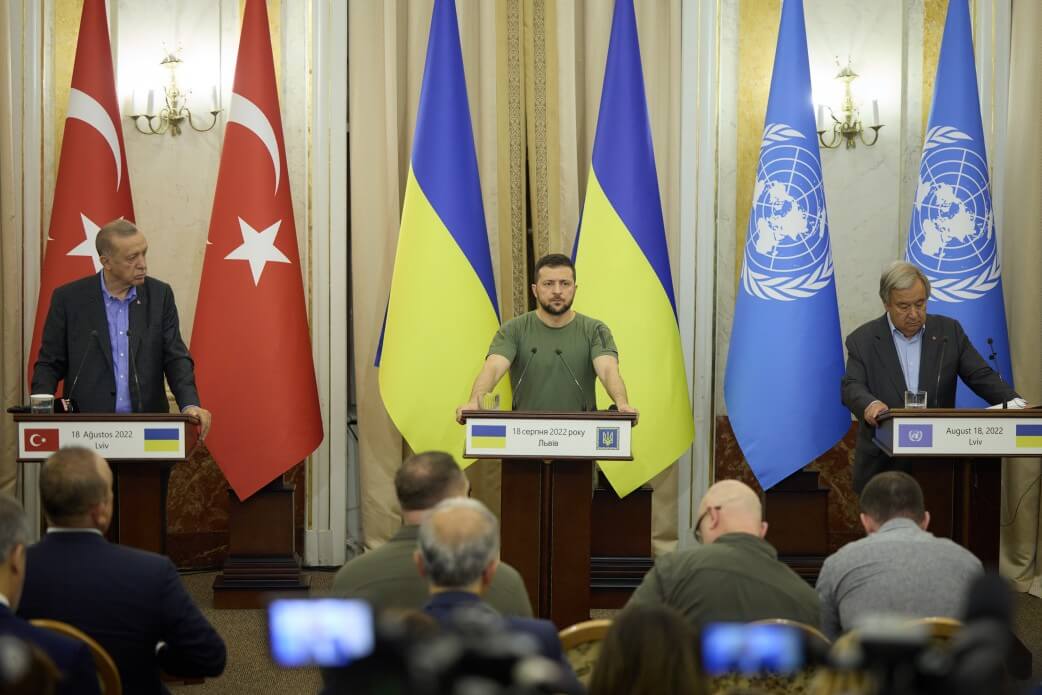Turkish President Recep Tayyip Erdoğan on Thursday warned that Russia’s shelling of the Zaporizhzhia nuclear power plant (ZNPP) could lead to a nuclear disaster.
Speaking at a joint conference in Lviv alongside Ukrainian President Volodymyr Zelensky and United Nations (UN) Secretary-General António Guterres, Erdoğan expressed concerns regarding the fighting between Russian and Ukrainian forces around the nuclear plant, which is the largest in Europe and the tenth largest in the world. “We don’t want to experience another Chernobyl,” he said, referring to the Chernobyl nuclear accident of 1986 in Pripyat, Ukraine.
The world is on a verge of nuclear disaster due to occupation of world's third largest nuclear power plant in Energodar, Zaporizhzhia region. How long will it take the global community to respond to Russia's irresponsible actions and nuclear blackmailing? https://t.co/lGHlhALMqV
— Володимир Зеленський (@ZelenskyyUa) August 18, 2022
Since August, Ukraine has accused Russia of intensifying attacks on the nuclear plant. President Volodymyr Zelensky has said Moscow is waging “nuclear terror.” Authorities have also said Russian shelling has destroyed three radiation sensors in the plant. Moreover, Ukraine’s state-owned nuclear power company, Energoatom, claimed that Russia plans to disconnect the plant from the Ukrainian grid and connect it to the Russian one.
Zelensky said during Thursday’s meeting that Russia’s actions around the Zaporizhzhia plant are dangerous. “Russia must immediately and without any conditions withdraw its troops from the territory of the ZNPP,” he asserted. “It is unacceptable that Russia is deliberately putting all of us on the brink of a global radiation disaster.”
We are deeply saddened by the casualties in the war, which has been raging for almost six months.
— Recep Tayyip Erdoğan (@RTErdogan) August 18, 2022
We reiterate our support for Ukraine's territorial integrity and sovereignty. pic.twitter.com/CSg9vHcLck
Zelensky also mentioned that Guterres agreed with him about sending an International Atomic Energy Agency (IAEA) fact-finding mission to the plant. He also urged the UN to officially condemn Russia’s actions.
“Nuclear blackmail of Russia should definitely be a decisive argument for everyone who still doubted that Russia deserves official recognition as a terrorist state and the corresponding political and legal attitude,” he added.
Guterres thus called on Russia to stop all activities around the nuclear plant. “I remain gravely concerned about the unfolding situation in and around Europe’s largest nuclear power plant in Zaporizhzhia,” he said “Common sense must prevail to avoid any actions that might endanger the physical integrity, safety or security of the nuclear plant,” the UN chief remarked.
Turkey's Erdogan warns about the risk of a new Chernobyl in Ukraine
— Samuel Ramani (@SamRamani2) August 18, 2022
In keeping with Turkey's consistent defence of Ukraine's sovereignty since 2014, Turkey was one of 42 countries to call for Russia's withdrawal from the Zaporizhzhia nuclear plant
He called on both sides to demilitarise the area because “any potential damage to Zaporizhzhia is suicide.” Guterres also noted that the UN with support a potential IAEA mission with logistics and security provided both Ukraine and Russia agree.|
Russia, on the other hand, has blamed Ukraine for the shelling.
The three leaders also discussed the global food crisis caused by the fighting in Eastern Europe. Guterres stressed that “there is no solution to the global food crisis without ensuring full global access to Ukraine’s food products and Russian food and fertilisers.” He noted that since Russia, Ukraine, and Turkey signed an agreement to unblock Ukrainian grain exports, 21 ships carrying over 560,000 metric tonnes of grain have departed Ukrainian ports for markets around the world.
Last month, Kyiv, Moscow, Ankara, and the UN agreed to establish a “coordination centre” in Istanbul to oversee transfers of Ukrainian exports. Representatives from all parties will be at the centre, which will establish joint controls at the port exit and arrival points. Officials will check vessels for weapons and ensure navigational safety on the transfer routes.

